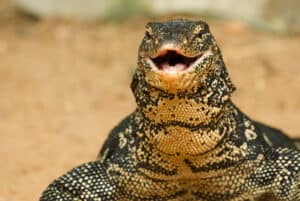Whether they’re hanging around in your garden eating your plants or leaving their unpleasant droppings around your home, lizards can be quite destructive, unwelcome guests. If you’re looking for ways to keep lizards away from your property, there are thankfully plenty of humane and inexpensive methods at your disposal.
From various types of repellents to a bit of simple home maintenance, here are some of the most effective ways you can gently encourage lizards of all kinds to stay out of your space.
Why Keep Lizards Away From Your Home and Garden?
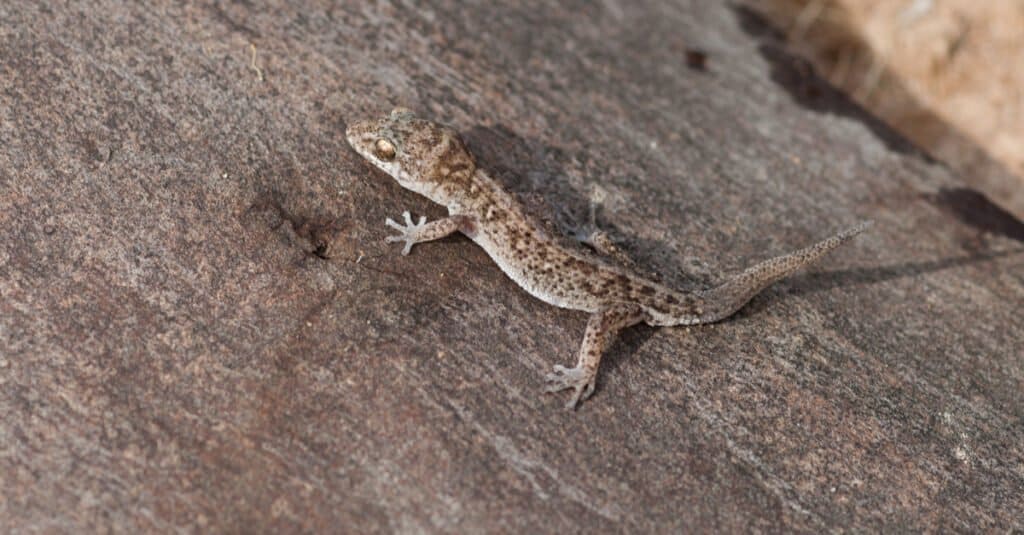
Even the tiniest of house geckos can be destructive and attract other pests.
©DOME PRATUMTONG/Shutterstock.com
If you’re here, you likely already have a reason or two of your own for keeping lizards away. However, there are actually many reasons why it’s a good idea to lizard-proof your home and yard, including:
- Lizards can attract other troublesome, damaging pests like snakes, frogs, and insects
- Lizard droppings and their shed skin can make a mess and carry dangerous bacteria and viruses
- Some species of lizards are mildly toxic if eaten by pets like dogs and cats
- Lizards can be destructive to gardens, especially herbivorous and omnivorous species that eat a wide range of fruits, vegetables, and other plants
- Lizards can breed quickly and establish large populations within weeks if conditions are preferable for them
Depending on their species, some lizards can be beneficial to have around, as they eat all kinds of damaging insects like ants, termites, and ticks. However, in many cases, the cons associated with accommodating the lizards can quickly outweigh the benefits! What’s more, you could go from one or two geckos to an entire colony very quickly, which can be even more destructive to your lawn, garden, and home.
Next, let’s take a look at what you should do to keep these little reptiles away–humanely, of course!
Lizard Repellents: Homemade and Commercial
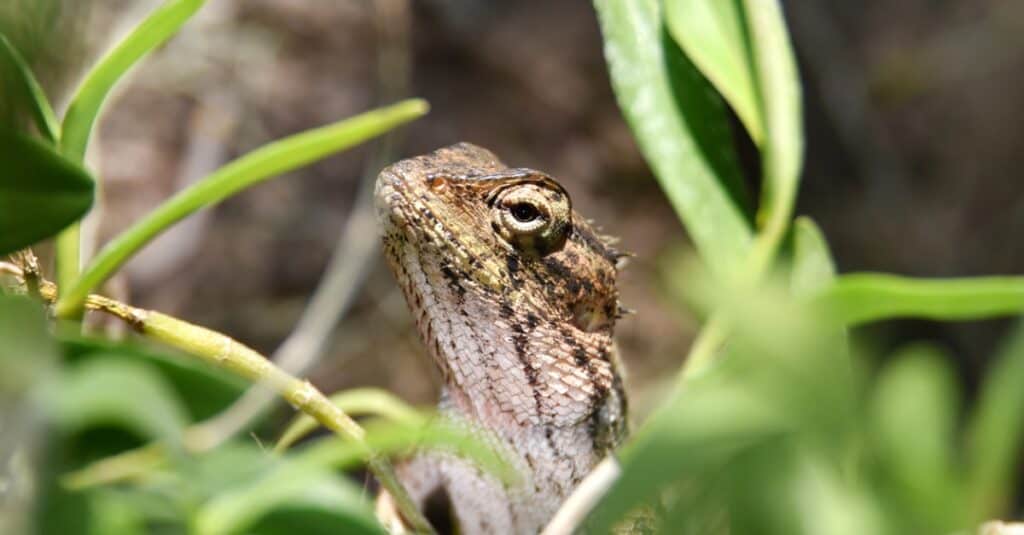
Most lizards prefer to hide amongst leaf litter, brush, and other plant growth.
©iStock.com/savana poto
Perhaps the most popular and effective means of keeping lizards and other pests at bay are simple repellents. Some are homemade, while other commercial premade products use various chemicals and scents to repel the reptilian critters. Rather than having to harm the lizards or capture and relocate them, you can simply encourage them to head elsewhere.
Some of the most popular household lizard repellents include:
- Hot sauce, cayenne pepper, or anything with a “spicy” odor
- Garlic
- Coffee grounds
- Naphthalene (Moth balls)
- Black pepper
- Mint leaves
- Citrus (peels, leaves, fruit)
Be sure to never apply any of these products directly to a lizard’s skin, eyes, or mouth. Only apply them to areas you want to keep the lizards from accessing. The perimeter of your yard and any entry points in your home can be good places to utilize these repellents.
As far as commercial products, there is a wide range of sprays and powders designed to repel lizards. These include the likes of Natural Armor, Lizard Defense, and Lizard Blocker, among many others. These can be purchased from online retailers or from various home and garden shops.
Unfortunately, both types of repellents come with a few caveats. The main issue with homemade remedies is they don’t have much scientific backing when it comes to their efficacy. Notably, a few have been tested more thoroughly, such as Kaffir lime extract, with varying results.
On the other hand, when it comes to commercial products, they can be very effective, but you’ll need to carefully read the label to ensure none of the ingredients are lethal or toxic to the lizards (or, potentially, to your pets or other pets in your neighborhood).
Close Off Entry Points and Keep Your Home Clean
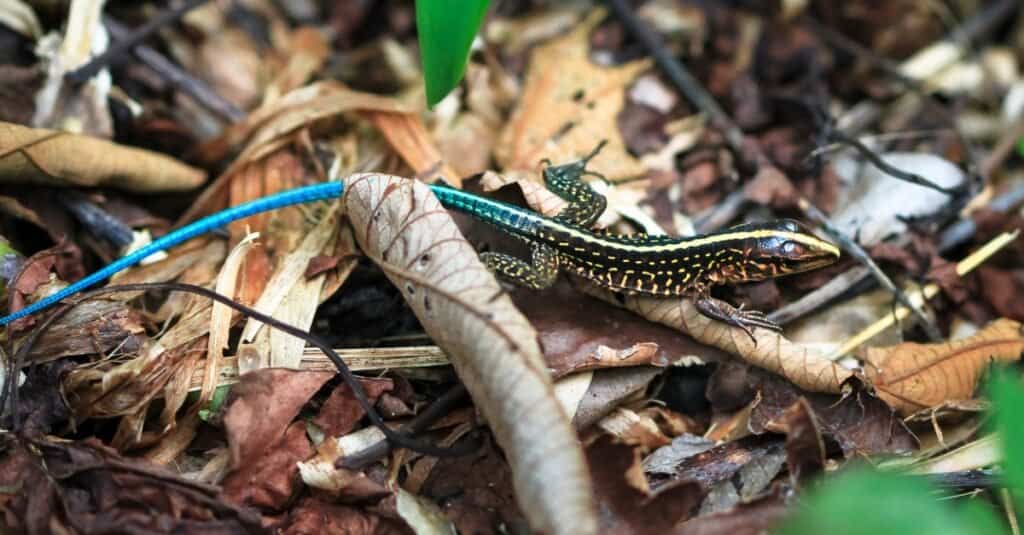
Many lizards are small and nimble enough to breach even the tiniest cracks and crevices.
©iStock.com/Kevin Wells
If you want to keep lizards away from your home, garage, shed, or any other buildings on your property, you’ll definitely want to seal off their possible entry points. Even the tiniest house geckos can be troublesome to deal with! At only around two to three inches long, these lizards can slip through just about any crevice with ease.
Check around any doors or windows for any openings a lizard could take advantage of. Your kitchen is a prime target for many lizards, especially if you ever have fruit or vegetables out in the open. Some lizards are omnivorous, some are herbivorous, and some are strict carnivores, but most are pretty opportunistic and will take any chance they can for a free meal.
In the process of closing off any cracks and crevices, keep an eye out for any clutter or potential areas the lizards could use for shelter. Wood piles, trash cans, and various indoor and outdoor plants can all provide lizards with convenient hiding spots. If you have any plants you’re maintaining indoors, keep them trimmed and well-maintained.
Keep Your Lawn Well-Maintained
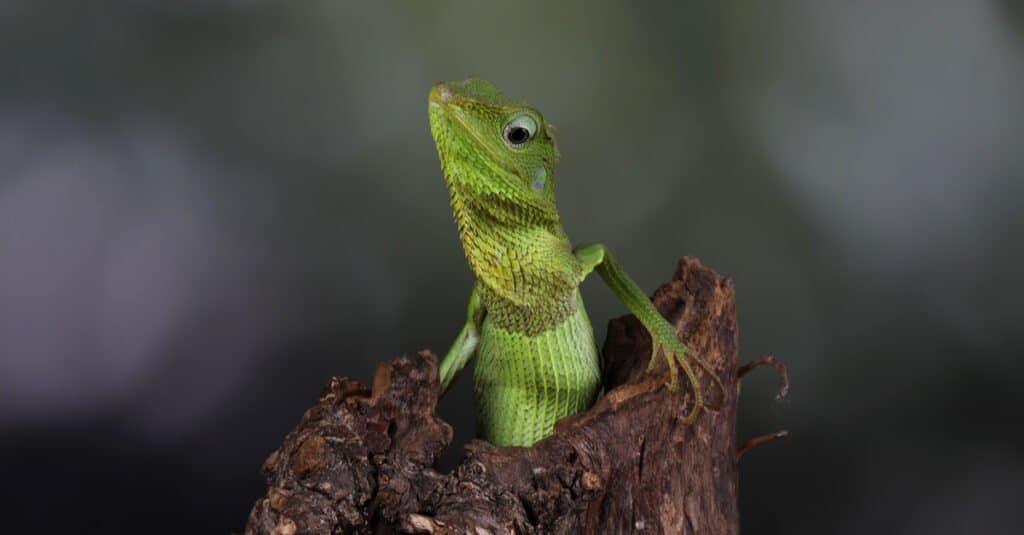
A bit of lawn maintenance will go a long way in keeping lizards away from your yard and home.
©Lauren Suryanata/Shutterstock.com
To keep lizards away from your garden or yard in general, regular lawn maintenance is essential. Overgrown weeds, other plants, poor drainage, and excess clutter, in general, will provide the perfect shelter for many species of lizards as well as the various insects they prey upon and their predators like snakes and frogs.
In turn, the combination of these species can be extremely destructive to gardens and lawns. This can lead to the lizards getting into your home in search of more food or shelter. If conditions are favorable enough, they may even breed, lay eggs, and produce more lizards.
Here are some things to keep in mind when lizard-proofing your yard:
- Keep your lawn mowed short
- Treat any weeds immediately to prevent them from growing out of control
- Make sure any hedges, trees, or other plants surrounding your home or other buildings on your property are trimmed regularly
- Keep clutter and lawn decorations to a minimum
- Provide proper drainage to prevent groundwater buildup
Above all, keep your yard as neat and clean as possible. If the lizards don’t have any incentive to stick around (as in food and shelter), they’ll move on pretty quickly.
The photo featured at the top of this post is © Lauren Suryanata/Shutterstock.com
Thank you for reading! Have some feedback for us? Contact the AZ Animals editorial team.



